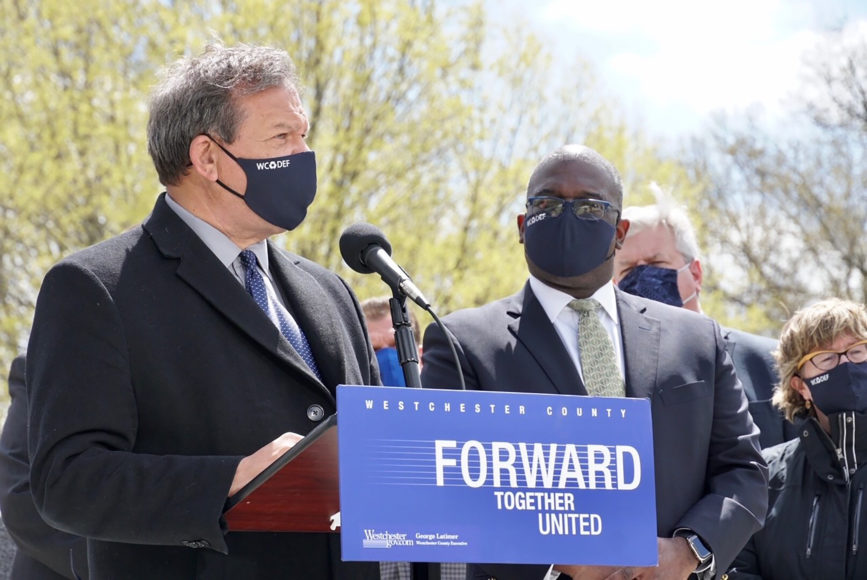Hoda Kotb and Savannah Guthrie of “The Today Show”; Jimmy Fallon of “The Tonight Show”; “Late Night’s”Seth Meyers; “The Late Late Show” host James Corden; Whoopi Goldberg; LL Cool J; Sen. Lindsay Graham; Rev. Jesse Jackson; Ellen DeGeneres; Hugh Jackman; and Khloé Kardashian.
They’re just a few of the people who have something in common with Westchester County Executive George Latimer and Deputy County Executive Ken Jenkins. They were all vaccinated against Covid-19, contracted mild cases of the virus from which they’ve recovered and credit the vaccine with preventing what could have been a much worse illness.
For Latimer and Jenkins, the county’s top two government officials, there was a certain irony in being infected with the virus. After all, they had put in so much time and effort leading the county’s response to the pandemic. They were continuing to provide guidance for Westchester’s more than one-million residents on how best to cope with not only the disruption to daily routines but the very real threat to life.
“When I tested positive on Dec. 12, I was surprised because at that point in time we still weren’t dealing with the explosion of positives due to the Omicron variant,” Latimer tells WAG. “Now, so many people I know that hadn’t gotten it have gotten it.”
Latimer said his first reaction was to try to figure out how seriously ill he might become as a result of the virus.
“I was asymptomatic at the time of my testing and I ultimately developed no fever,” he says. “I developed no loss of taste or smell. I did not have any chills. I did not have any respiratory problems. I had a slight cough and a little bit of a runny nose.My second reaction was that ‘I can’t go into the office.’ I have a dynamic job with lots of things to do.”
Latimer says that he was able to make a smooth transition to working from home in isolation, including using his computer to originate Zoom conferences and telecasts of events such as Covid briefings and signing the new county budget:
“I knew that I could manage having to be off by myself. I talked to the office and went over what was coming up, what would I have to be involved with, what could be postponed. What happened over the course of the 10 days of my isolation was that a lot of events were cancelled, postponed or turned to virtual.”
Latimer notes that he had been out in the community at various times since the pandemic started. He was routinely taking precautions — including wearing a mask, maintaining social distancing, avoiding poorly ventilated spaces, frequently washing hands or using hand sanitizer and making whatever schedule adjustments seemed appropriate.
“It did occur to me that I was lucky it didn’t happen sooner. It could have been the Alpha or Delta variants and I was lucky I got a milder version of it,” he adds.
For Jenkins, coming down with Covid served to underscore that society is going to have to learn to accept the existence of the virus well into the future. He says he feels fortunate to having been able to isolate at home, in the basement, while recovering.
“I had body aches, chills, no fever, but I had a cough. The first few days it was mild and then the symptoms went away. I felt like I could have come back to the office, but the rule was to stay away for 10 days,” Jenkins tells WAG.
“We can do everything we can possibly do to protect ourselves as best as we can, but at the end of the day it’s a virus and you can contract it through no ill-will of anyone or despite not doing anything wrong,” Jenkins says. “We have to navigate through this. We have to learn how to live with this particular virus because right now it doesn’t look as if it’s going to get eradicated like polio.” (According to the CDC, the Centers for Disease Control and Prevention, polio hung around the United States for 24 years after the introduction of the polio vaccine in 1955. The last reported case was 1979.)
Jenkins recalls that from the beginning of the pandemic both he and the county executive were out in the community while observing whatever the health and safety guidance happened to be at the time.
“The feedback I’ve been getting recently is the frustration overall from people who are trying to understand how best to continue with their lives in whatever is going to be our new normal,” Jenkins says. “We don’t want to be in a place where we have to shut down again. We went from a very bad scenario where people were dying at an extraordinary rate from contracting this disease…to a place where people get vaccinated so that if and when they contract it they’ll be able to survive it.”
Jenkins says that one of the reasons 92.85% of Westchester residents received at least one vaccination shot as of Jan. 10 was that he, Latimer, the county health department and others concentrated on communicating facts rather than rhetoric:
“We said, ‘Here’s what we know and here’s what we don’t know.’ We utilized everything in our toolbox from politics, government experience, professional experience in the private sector to be able to use communications and relationships to reach out and help people to understand.”
Latimer emphasizes that the Omicron variant is extraordinarily communicable.
“We’ve had an explosion in the number of infections,” he says. “Early on, the most active cases of known Covid we had was about 12,000 on a given day. We hit that peak twice. Today, we’re three times the amount of active cases. This thing is everything they’ve billed it to be. It’s so communicable there’s nothing you can compare it with in the past.”
Latimer says that the impatience that’s common among so many Americans has surfaced with respect to the pandemic:
“We have never lived through two years of a pandemic like this. We are not a nation of people that loves going through long, enduring difficulties,” he says. “We want to get something over with: ‘Let’s fight it, let’s do it, let’s get it behind us.’ That’s not what this is. This is analogous to what my parents talked about living through the Depression and the (World War II) years in which there was a long period of sacrifice and a long period of not knowing how things were going to turn out.”
Latimer bemoaned the fact that dealing with the pandemic has become politicized for many and caught up in the divisions that exist in the country.
“I think we could have Covid as a regular disease that we’re going to have to worry about,” Latimer said. “If you’re vulnerable to it, there’s a very good chance it could pose real problems for you and you’re going to get an annual shot, the way people of my age get an annual flu shot. You’re going to have to be prudent and pragmatic about it.”






